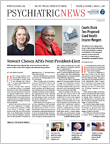The randomized, controlled clinical trial (RCT) is often considered the “gold standard” for evidence-based practice.
Yet experienced clinicians also know that results from studies relying on trial-eligible patients don’t always generalize to patients with more complex illnesses who show up in a clinician’s office. Moreover, broadly inclusive effectiveness trials—such as the Clinical Antipsychotic Trials of Intervention Effectiveness (CATIE) or Sequenced Treatment Alternatives to Relieve Depression (STAR*D)—suggest that psychiatric medications that show effectiveness in RCTs may be substantially less efficacious in routine clinical practice.
That’s why APA’s Focus: The Journal of Lifelong Learning in Psychiatry has initiated a new editorial section called “Applied Armamentarium.” The goal of the section is to fill the gap between the results derived from regulatory trials and psychopharmacological management as it occurs in the clinic.
The section, which will make its first appearance in the fall 2017 edition of Focus, will be edited by Boadie Dunlop, M.D., M.S. (Focus is an APA journal whose mission is to disseminate up-to-date information while facilitating lifelong study skills and critical self-assessment for improving patient care and preparation for Maintenance of Certification.)
Journal editor Mark Rapaport, M.D., who is chair of the Council on Medical Education and Lifelong Learning, told Psychiatric News that the new editorial section will provide a place for psychiatrists to submit their ideas about how the full range of the psychiatric armamentarium is applied in real-world clinical practice. “We want to have a forum available for clinicians who are doing interesting things in the treatment of challenging patients,” he said. “They can submit case histories or small-scale studies, discuss the strengths and limitations of the work they are doing, share the results, and talk about where these innovative strategies need to go next.
“It will give clinicians who are treating patients with complex disorders new ideas about what their colleagues in the field are doing,” said Rapaport, who is also the chair of the Department of Psychiatry and Behavioral Sciences at Emory University School of Medicine. “We believe this fills a gap in the published literature and will be unique.”
Examples of the sorts of submissions Rapaport and colleagues would like to see for the new section include the following:
•
Clinical trials reporting unique interventions in challenging patient samples.
•
Case series of challenging clinical scenarios that suggest a novel or effective application of psychopharmacology or somatic therapies.
•
Electronic medical record evaluations of medication combinations or the effects of psychotropics on patients with complex medical status.
•
Clinical applications of biomedical testing procedures that assist in the selection or use of therapies.
•
Highly compelling and convincing individual case reports of innovative treatment approaches.
•
Commentaries offering original perspectives on an aspect of clinical psychopharmacology.
In an editorial in the winter issue of Focus, Rapaport wrote about the new section: “With the expansion of options, including somatic therapies such as deep brain stimulation and transcranial magnetic stimulation, clinicians are encountering increasing numbers of patients undertaking treatment regimens that often have not been subject to controlled studies. Other patients have multiple psychiatric or medical comorbidities—or are taking medications for other diseases—that introduce uncertainty into treatment selections. The result is that clinicians are often working with patients for whom the existing evidence base provides little guidance. … There is thus a great need for published clinical evidence that can fill the gap between the results derived from regulatory trials and psychopharmacological management as it occurs in the clinic.” ■
“Introducing a New Section: The Applied Armamentarium” can be accessed
here. Inquiries about this section should be sent to Boadie Dunlop, M.D., M.S., at
[email protected]. Subscription information is available
here.

